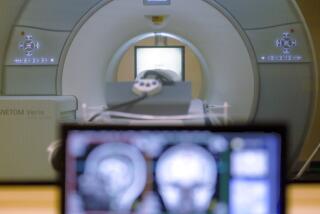Doctors Cannot Explain Teen’s Cancer Remission
- Share via
CENTREVILLE, Va. — A month ago, Russell Cram began attending to the grim details of death. What kind of funeral service was right for his terminally ill 17-year-old son? Where should Tommy be buried?
“Every day I was preparing myself for what life would be like when Tommy was gone,” Cram said. “In February, the doctors gave him absolutely no hope. They gave us one to eight months.”
But this month, Cram and his family received news they are still struggling to comprehend: New tests show no evidence of the brain tumor that had been killing Tommy.
“It’s like a happy ending in a movie,” Cram said. “You would say, ‘Oh that’s just Hollywood, but it would never happen in real life.’ ”
“It’s hard to believe, really,” Tommy said. “One month they’re telling you you’re going to die, and the next month they say you’ve got your whole life in front of you. It’s kind of hard to grasp.”
Doctors treating Tommy at Duke University Medical Center in Durham, N.C., are at a loss to explain the unexpected remission.
“We are not telling him he’s cured. We will watch it very closely,” said Dr. Henry Friedman, a cancer specialist who began treating Tommy in December.
Friedman has never seen or heard of another case in which a tumor like Tommy’s disappeared after brief chemotherapy. “It’s akin to hitting the lottery,” he said.
Doctors found Tommy’s brain cancer last August, and he had surgery to remove a tumor. But in December, doctors found the cancer had spread to his spine.
Tommy went to Duke, where Friedman tried innovative chemotherapy. The treatment this spring didn’t appear to be working, and Tommy asked his doctors to stop the drugs. “He thought the chemotherapy was making him feel sick and he didn’t want it anymore. He wanted to make his plans to die,” Friedman said.
Brain scans in April showed some improvement, but the family didn’t really believe it, Cram said. Then Friedman summoned Tommy to Duke in early May for more extensive tests, including magnetic resonance imaging.
“We compared the MRI to the earlier results, and we were shocked, that would be a good word for it. Pleasantly shocked,” Friedman said.
More to Read
Sign up for Essential California
The most important California stories and recommendations in your inbox every morning.
You may occasionally receive promotional content from the Los Angeles Times.










